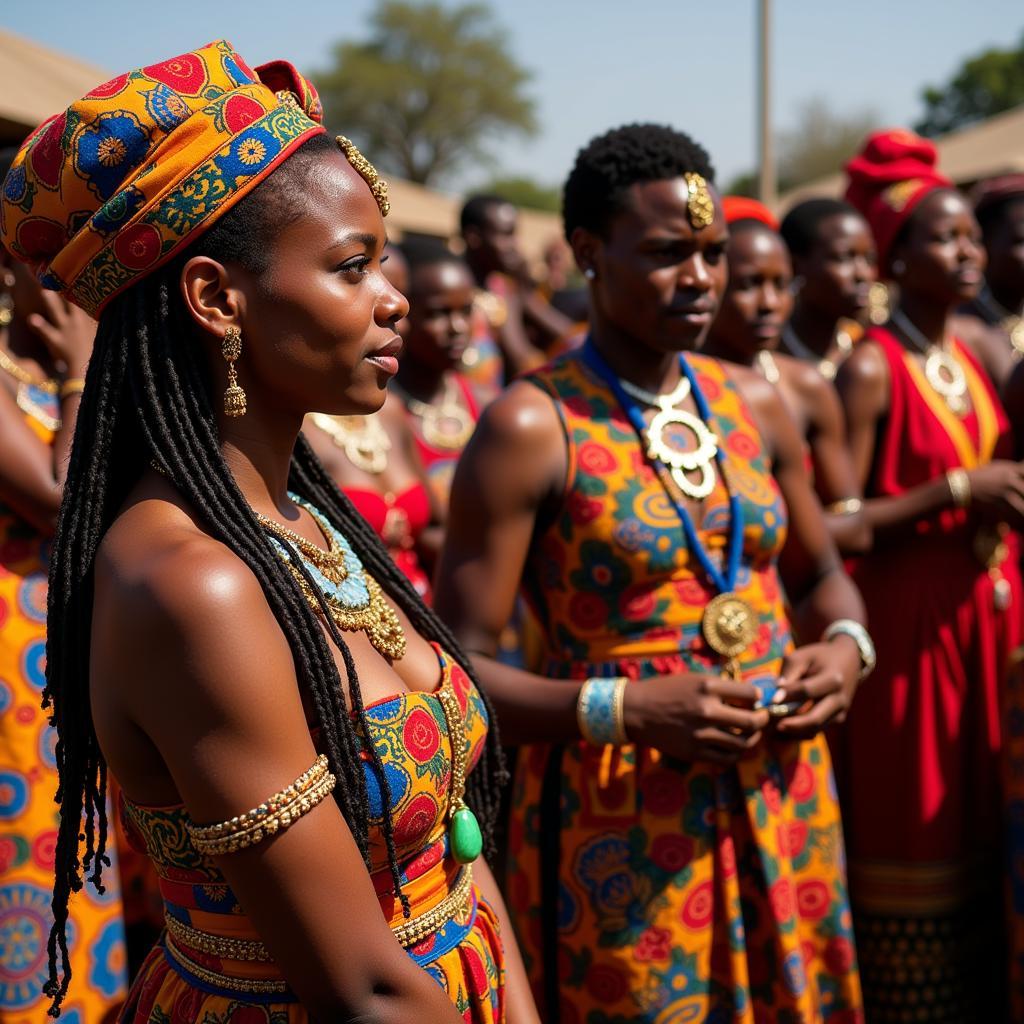African Folktales About Family: Exploring Bonds, Values, and Traditions
African Folktales About Family offer a captivating glimpse into the rich tapestry of cultures and traditions across the continent. These stories, passed down through generations, not only entertain but also impart valuable lessons about love, loyalty, respect, and the importance of kinship. They explore the dynamics within families, the challenges they face, and the enduring strength of familial bonds. Let’s delve into the enchanting world of African folktales about family.
The Significance of Family in African Folktales
Family is a central theme in African storytelling. It represents the cornerstone of society, a source of strength, wisdom, and identity. Folktales often depict families facing various trials and tribulations, from external conflicts with nature or other communities to internal struggles with jealousy or betrayal. These narratives highlight the importance of unity, cooperation, and mutual support in overcoming adversity. Many tales emphasize the respect for elders and the wisdom they possess, showcasing the intergenerational transfer of knowledge and traditions.
Many folktales demonstrate how family values are instilled through storytelling. Children learn about their heritage, their responsibilities, and the importance of community through these narratives. These stories serve as a moral compass, guiding them towards ethical behavior and reinforcing the values that are cherished within their culture.
Exploring Different Types of African Folktales about Family
African folktales about family encompass a wide range of themes and narratives. Some stories focus on the bond between siblings, exploring themes of rivalry, loyalty, and forgiveness. Others highlight the relationship between parents and children, emphasizing the importance of obedience, respect, and filial piety. There are also tales that celebrate the wisdom and guidance of grandparents, portraying them as keepers of tradition and sources of wisdom. These stories, rich in symbolism and metaphors, offer profound insights into the human condition and the complexities of family relationships.
One common type of African folktale about family features animal protagonists. These stories, while entertaining, often carry deeper meanings related to human behavior and social dynamics within the family unit. The cunning hare, the wise tortoise, and the powerful lion often represent different personality types and family roles, providing valuable lessons about cooperation, conflict resolution, and the importance of community.
How African Folktales Reflect Cultural Values
African folktales about family serve as a mirror reflecting the cultural values and beliefs of various communities across the continent. They showcase the importance of extended family, the role of ancestors, and the interconnectedness of individuals within a larger social fabric. The stories often emphasize the importance of oral tradition, as they are passed down through generations, preserving cultural heritage and shaping the identity of individuals within a community. By studying these folktales, we gain a deeper understanding of the diverse cultures and traditions that make up the rich tapestry of African life.
Dr. Anika Nkosi, a renowned anthropologist specializing in African folklore, notes, “These stories are not simply entertainment. They are powerful tools for transmitting cultural knowledge, values, and beliefs across generations.”
african folktales for children are often adapted and simplified for younger audiences, focusing on simple morals and entertaining narratives.
Why Are African Folktales About Family Important Today?
In a rapidly changing world, African folktales about family remain relevant and important. They remind us of the enduring power of family bonds, the importance of tradition, and the values that underpin a strong and resilient community. These stories offer valuable lessons for navigating the complexities of family relationships, promoting understanding, empathy, and respect across generations. By sharing these stories, we can foster a deeper appreciation for the rich cultural heritage of Africa and its enduring wisdom.
Professor Kwame Asante, a leading scholar of African literature, states, “African folktales about family offer a timeless wisdom that can help us navigate the challenges of modern life. They remind us of the importance of connection, belonging, and the enduring power of love.”
african childrens literature is a growing field that continues to draw inspiration from traditional folktales, ensuring these stories continue to reach new audiences.
Conclusion
African folktales about family provide a captivating window into the diverse cultures and traditions of the continent. They offer valuable insights into the importance of family bonds, the transmission of cultural values, and the enduring strength of kinship. By exploring these stories, we can gain a deeper appreciation for the richness and complexity of African Life and the timeless wisdom they hold. Let us continue to share and celebrate these narratives, ensuring that they continue to inspire and enlighten generations to come. african culture in childcare often incorporates storytelling, reflecting the importance of these narratives in shaping young minds.
FAQ
- What are some common themes in African folktales about family? Common themes include love, loyalty, respect, obedience, the importance of elders, and overcoming adversity.
- Why are animal characters often used in African folktales? Animals often represent different personality types and family roles, making the stories engaging while conveying moral lessons. african folktale hare is a popular example.
- How are African folktales passed down through generations? Primarily through oral tradition, with storytelling playing a vital role in preserving cultural heritage.
- What can we learn from African folktales about family? We can learn about different cultural values, the importance of kinship, and strategies for navigating family relationships.
- Where can I find more African folktales about family? Libraries, online resources, and cultural centers offer a wealth of information and collections of African folktales.
- How do African folktales contribute to children’s development? They stimulate imagination, teach moral lessons, and provide a connection to cultural heritage.
- Are there any modern adaptations of African folktales? Yes, many contemporary authors and artists are reimagining and adapting these stories for modern audiences.
More Questions?
- How do African folktales reflect societal norms and expectations?
- What are some regional variations in African folktales about family?
For further assistance, please contact us at:
Phone: +255768904061
Email: kaka.mag@gmail.com
Address: Mbarali DC Mawindi, Kangaga, Tanzania.
Our customer service team is available 24/7.

